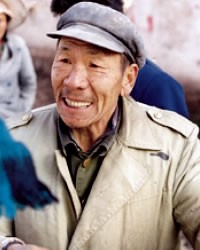Han Chinese, Min Nan in Japan

Photo Source:
Asia Harvest-Operation Myanmar
|
Send Joshua Project a map of this people group.
|
| People Name: | Han Chinese, Min Nan |
| Country: | Japan |
| 10/40 Window: | Yes |
| Population: | 73,000 |
| World Population: | 43,504,500 |
| Primary Language: | Chinese, Min Nan |
| Primary Religion: | Ethnic Religions |
| Christian Adherents: | 10.00 % |
| Evangelicals: | 5.00 % |
| Scripture: | Complete Bible |
| Ministry Resources: | Yes |
| Jesus Film: | Yes |
| Audio Recordings: | Yes |
| People Cluster: | Chinese |
| Affinity Bloc: | East Asian Peoples |
| Progress Level: |
|
Introduction / History
The Min Nan language is also called Hokkien. It is primarily spoken along China's eastern and southern coasts, Hong Kong, Thailand, and especially in Taiwan. Their language came from a tenth-century kingdom based in Fujian, now a province of China.
Min Nan speakers are among the Han Chinese, the largest ethnic group worldwide. They are the majority in China, but there is a Chinese diaspora in most world nations.
The Han Chinese fled to other countries after the Mongol invasion in 1276. Though they weren't the first Chinese to settle in Japan, there were Chinese settlers there. Some became politically powerful in Japan. Through the centuries, Japan has been a place where Chinese rebels have found refuge. Among them is Sun Yat-sen.
Min Nan speakers live in Japan along with other Han Chinese groups. They are most likely to be found in Tokyo, Osaka, Yokohama and other urban centers. The Chinese are the largest group of foreigners in Japan.
What Are Their Lives Like?
Japan is a business-oriented country, and the Min Nan people fit in well. They are among those who aid in trade between Japan and China. Others invest in Japanese real estate. Japan is attracting both businessmen and intellectuals from China.
In the 2020s, many wealthy Chinese have moved to Japan to conduct business. They often move to Japan to protect their family assets and for better educational opportunities for their children. Some come for better medical care. Japan has an aging and shrinking workforce, so it's very possible they will welcome Chinese migrants in the years to come.
What Are Their Beliefs?
Most Min Nan Chinese have maintained the traditional Chinese religion. Over time these traditional religious beliefs added elements of Buddhism, Confucianism and Taoism. These beliefs are centered around the concept of maintaining harmony, something greatly valued by all Chinese people.
The Min Nam Chinese consult horoscopes in an attempt to determine what course of action will promote harmony and bring good luck. They also believe in a pantheon of spirits who inhabit the earth. The spirits of their ancestors supposedly roam the earth, and if treated properly they will bring good luck. Ghosts are the spirits of people who are angry at the circumstances of their death; they are malicious and capricious. By contrast, deities are the souls of people who lived virtuous lives. They have spiritual powers that can be used to benefit those who worship them. Although the Min Nam Chinese claim adherence to these beliefs, they seem to have little effect on their everyday lives. Many are non-religious in their daily practices.
There is a small percentage of Christians among Min Nan speakers. Most of these are strong in their faith. They can be used by God to disciple many.
What Are Their Needs?
Japan is a country where foreigners are not well accepted. Han Chinese people like the Min Nan speakers sometimes feel excluded.
Prayer Points
Pray for Min Nan workers, filled with the fruit of the Holy Spirit, to disciple the Japanese.
Pray for Min Nan speakers to begin a family-based movement to Christ that will bless them abundantly.
Pray for Min Nan speakers to have the spiritual hunger to seek and find Jesus Christ.